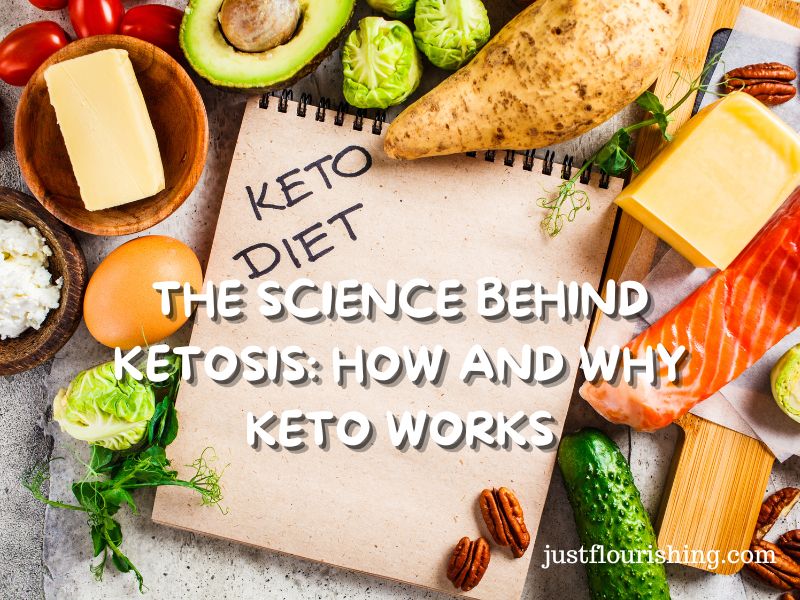Exploring the science behind ketosis and the efficacy of the popular keto diet, this intriguing article is supported by scientific evidence.
It delves into the intricate process of ketone production, shedding light on the role of carbohydrates and fat.
Emphasizing the numerous benefits of ketosis for weight loss and overall health, this informative piece aims to provide an objective and evidence-based understanding of the science behind the effectiveness of the keto diet.

Key Takeaways
- Ketosis is a metabolic state where the body uses fat as its primary fuel source.
- Carbohydrates are the primary fuel source reduced during ketosis, and the body breaks down fat stores to produce ketones as an alternative energy source.
- Fat becomes the primary fuel source when carbohydrates are restricted, and adequate fat intake is essential to sustain ketosis and maintain energy levels.
- Ketosis has potential benefits for weight loss, improving insulin sensitivity, reducing inflammation, and promoting feelings of fullness.
Understanding Ketosis: An Overview
Ketosis is a metabolic state in which the body shifts from using carbohydrates as its primary fuel source to using fat. This occurs when carbohydrate intake is significantly reduced, forcing the body to break down stored fat for energy.
In terms of athletic performance, some studies suggest that ketosis may have potential benefits. For endurance athletes, the ability to tap into fat stores may enhance endurance capacity. However, it’s important to note that the research in this area is limited, and individual responses may vary.
As for potential risks and side effects, ketosis can cause symptoms such as fatigue, headache, and nausea, known as the ‘keto flu.’ It can also lead to nutrient deficiencies if not carefully managed.
It’s crucial to consult with a healthcare professional before embarking on a ketogenic diet to ensure it’s safe and appropriate for individual needs.
The Role of Carbohydrates in Ketosis
Carbohydrates play a crucial role in the process of ketosis as the primary fuel source that’s reduced when entering this metabolic state. When carbohydrate intake is restricted, the body is forced to find an alternative source of energy.
In a normal diet, carbohydrates are broken down into glucose, which is then used by the body as its main source of fuel. However, when carbohydrate intake is limited, glucose metabolism is significantly reduced. As a result, the body begins to break down fat stores to produce ketones, which can be used as an alternative energy source.
This shift from glucose to ketones as the primary fuel source is what characterizes the state of ketosis. By restricting carbohydrates, individuals can induce ketosis and effectively tap into their fat stores for energy.
The Role of Fat in Ketosis
Fat plays a crucial role in ketosis as it becomes the primary fuel source when carbohydrates are restricted. When the body is in a state of ketosis, the role of dietary fat becomes even more important. Here are some key points regarding the role of fat in ketosis:
- Fat is broken down into fatty acids and converted into ketones, which are then used as energy by the body.
- The presence of ketones in the blood indicates that the body is in a state of ketosis.
- Consuming adequate amounts of dietary fat is essential to sustain ketosis and maintain energy levels.
- The metabolic changes that occur during ketosis enable the body to effectively utilize fat for energy, leading to weight loss.
Understanding the role of dietary fat in ketosis is crucial for individuals following a ketogenic diet or seeking to enter a state of ketosis. By restricting carbohydrates and increasing fat intake, the body can undergo metabolic changes that promote fat-burning and overall health.
The Science Behind Ketone Production
When the body is in a state of ketosis, ketone production occurs through the breakdown of fatty acids. This metabolic process, known as ketone metabolism, is a key aspect of the ketogenic diet and is responsible for its many effects on the body.
Ketones, such as beta-hydroxybutyrate (BHB), acetoacetate, and acetone, are produced in the liver when the body is low on glucose and starts using fat as its primary fuel source. This shift in energy metabolism has several benefits, including weight loss, improved mental clarity, increased energy levels, and reduced inflammation. The following table provides an overview of the different types of ketones and their functions:
| Ketone | Function |
|---|---|
| Beta-hydroxybutyrate (BHB) | Main ketone produced; provides energy for brain and muscles |
| Acetoacetate | Converted to BHB and used for energy production |
| Acetone | Byproduct of ketone metabolism; excreted through breath and urine |
Understanding the science behind ketone production is crucial for those following a ketogenic diet to achieve and maintain a state of ketosis.
The Benefits of Ketosis for Weight Loss and Health
Continuing from the previous subtopic, regularly maintaining a state of ketosis through the ketogenic diet offers numerous benefits for weight loss and overall health. Here are some of the key benefits:
- Ketosis and insulin resistance: The ketogenic diet can help improve insulin sensitivity and reduce insulin resistance. By reducing carbohydrate intake and increasing fat consumption, the body relies on ketones as a source of energy instead of glucose. This can help regulate blood sugar levels and improve insulin function.
- Ketosis and brain health: Ketones are an alternative fuel source for the brain, and research suggests that they may have neuroprotective effects. Some studies have shown that a ketogenic diet may help improve cognitive function, reduce inflammation in the brain, and protect against neurodegenerative diseases like Alzheimer’s.
- Weight loss: When the body is in ketosis, it becomes more efficient at burning fat for fuel. This can lead to significant weight loss, as the body taps into its fat stores for energy. Additionally, the ketogenic diet tends to be more satiating, meaning it can help reduce cravings and promote feelings of fullness, making it easier to adhere to a calorie deficit.
- Overall health: In addition to weight loss, maintaining ketosis can have positive effects on various health markers. It may help reduce inflammation, improve cholesterol levels, lower blood pressure, and promote overall metabolic health.
Frequently Asked Questions
Can the Keto Diet Be Followed by People With Certain Medical Conditions?
The keto diet can be followed by people with certain medical conditions, but there may be potential risks involved. It’s important for individuals with conditions such as diabetes, liver or kidney disease, or pancreatitis to consult with their healthcare provider before starting the keto diet. These conditions can be affected by the drastic changes in macronutrient intake that the diet requires.
A healthcare professional can help determine if the keto diet is appropriate and safe for each individual’s specific medical condition.
What Are Some Common Side Effects of Entering Ketosis?
Entering ketosis can have some common side effects. These may include fatigue, dizziness, nausea, and bad breath. These symptoms are often temporary and usually subside as the body adapts to using ketones for fuel.
However, it’s important to note that the long-term effects of ketosis are still being studied. While some research suggests potential benefits such as weight loss and improved insulin sensitivity, more studies are needed to fully understand the long-term effects of sustained ketosis.
Are There Any Specific Foods That Should Be Avoided While Following a Ketogenic Diet?
When following a ketogenic diet, there are certain foods that should be avoided. These include grains and sugary foods. Grains, such as wheat, rice, and oats, are high in carbohydrates, which can hinder the process of ketosis.
Sugary foods, like candy, soda, and pastries, also contain a lot of carbohydrates and can spike blood sugar levels. By avoiding these foods, individuals can maintain a state of ketosis and promote weight loss.
Can Ketosis Lead to Muscle Loss?
Ketosis is a metabolic state where the body uses fat for fuel instead of carbohydrates. While following a ketogenic diet, it’s common for individuals to lose weight, including muscle mass. However, ketosis itself doesn’t directly lead to muscle loss.
In fact, some studies suggest that the ketogenic diet may promote muscle preservation. By consuming adequate protein and engaging in resistance training, individuals can support muscle building and preservation while in ketosis.
Is It Necessary to Track Macronutrient Intake While on the Keto Diet?
While on the keto diet, it’s important to track macronutrient intake for optimal results.
For example, let’s say someone wants to achieve ketosis and burn fat efficiently. By tracking their macronutrients, they can ensure they’re consuming the right amount of fats, proteins, and carbohydrates to maintain ketosis.
Additionally, tracking macronutrients allows individuals to adjust their intake based on their specific goals and needs.
This approach provides a visual representation of the importance of hydration and the benefits of intermittent fasting.

Shahane Tan
Shahane Tan, a Nursing graduate from Xavier University, combines healthcare expertise with roles in real estate and life coaching. Passionate about holistic well-being, her insights bridge science and practicality. Explore her balanced wellness approach at JustFlourishing.com.

Leave a Reply